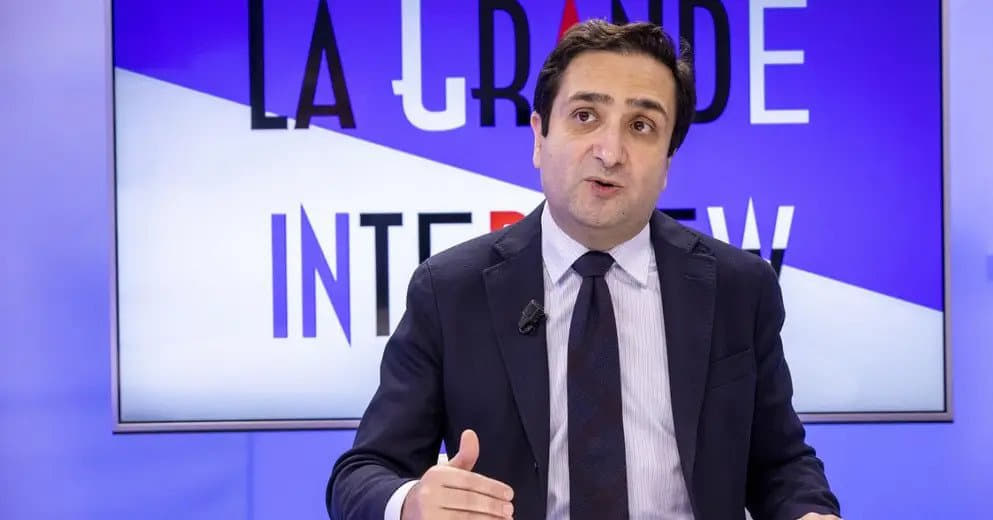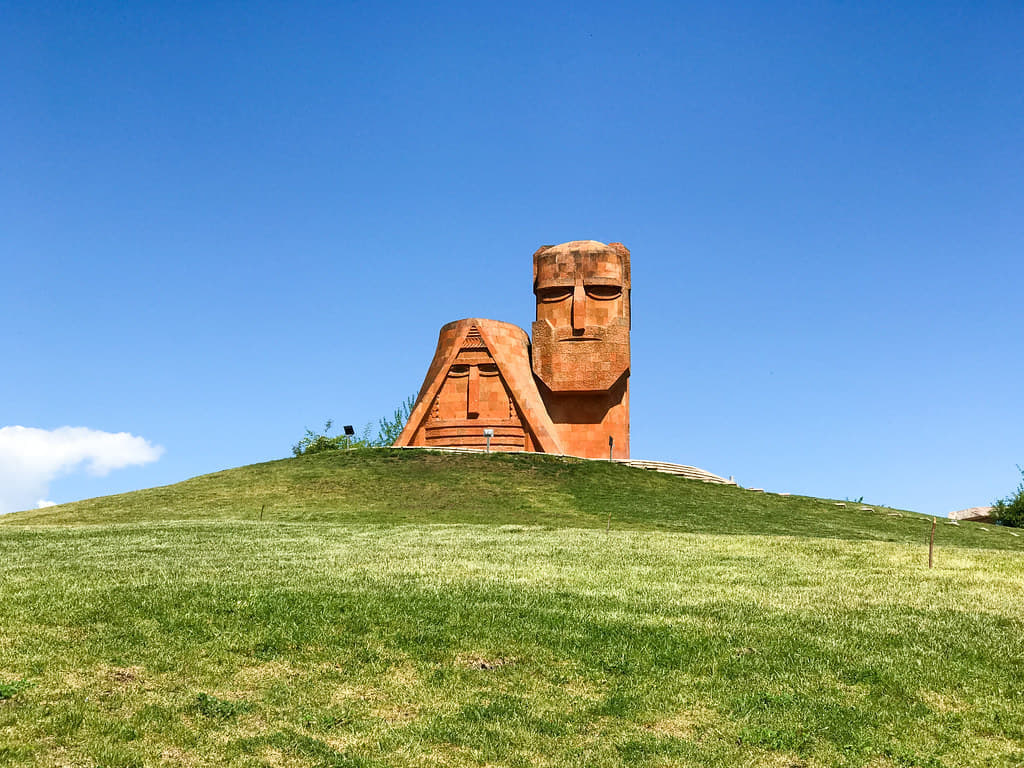Hovhannes Guevorkian is the representative of the Republic of Artsakh (Nagorno-Karabakh) in France. Here he speaks with Augustin Herbet about the current situation of his country, in the face of Azerbaijani aggression. This interview appears through the kind courtesy of La Nef.
Augustin Herbet (AH): What is the current situation of the Republic of Artsakh?
Hovhannes Guevorkian (HG): After the signing of the ceasefire on November 9, 2020, thanks to the deployment and reassuring presence of the Russian peacekeeping forces, nearly 80,000 Artsakhis, who had taken refuge in Armenia during the military aggression, returned to Artsakh to settle in the free zone—not occupied by Azerbaijan. Some 23,000 Artsakhis have not been able to return—these are the inhabitants of the territories under Azerbaijani control who were driven out and who will be murdered by the Baku regime, if they try to return to their homes.
Work on restoring civilian infrastructure deliberately targeted by the Azerbaijani army during the war—roads, hospitals, schools and homes—is almost complete. An ambitious housing construction program is also underway.

The new geography of Artsakh, the result of the war, poses a fundamental problem—the supply of water, since a portion of the springs that supply the country have been under the control of Azerbaijan since 2020. As well, the supply of energy and vital resources has been greatly weakened and depends entirely on the thin Lachin corridor that still links Artsakh to Armenia. Through regular incursions, Azerbaijan is trying to further weaken this link with Armenia by nibbling away at it in order to tighten this passage until it is completely strangled. Artsakh will then find itself completely enclosed in Azerbaijani territory. The consequences are easily imaginable.
AH: What reasons for hope are there for Artsakh?
HG: The first reason is political. Three major powers, Russia, which is now de facto protecting Artsakh, France and the United States of America, strongly engaged in mediation for the political settlement of the conflict within the framework of the co-chairmanship of the OSCE Minsk Group, have declared that the problem of Nagorno-Karabakh must be given a political solution. This statement contradicts Azerbaijan’s statement that the problem is already solved and cannot be negotiated.
The second reason is the undeniable reality of Artsakh’s existence, as evidenced by the viability of its functioning state, despite its current extreme fragility. The fact that the people of Artsakh have returned en masse and are determined to live there is in itself a sign of their faith in the future.
AH: What abuses are being committed by Azeri forces against Armenian cultural heritage in the Azeri-occupied part of Artsakh?
HG: According to the report of the Artsakh Human Rights Defender, 1456 Armenian cultural properties and monuments are now in the Azerbaijani occupied zone. Although Azerbaijan has been occupying these territories for a short time, we already know of a number of cases of vandalism and erasure of Armenian heritage in these occupied territories through the filmed and photographed testimonies of the soldiers or Azerbaijani officials themselves. For example, the medieval cemeteries and stone crosses in the village of Tsar in the Karvachar region, the Sourp Zoravor Astvatsatsin church near the town of Mekhakavan, and the church of Saint Yeghishe in the village of Mataghis. In fact, during his visit to the Armenian church in Tsakuri, President Aliyev expressed his intention to have its Armenian inscriptions removed. This policy of rewriting history portends the worst for the fate of Armenian Christian cultural heritage. The objective is obvious—to alienate these regions from the Armenians, to erase all traces of Armenian-ness so that the Armenians will never again have the desire to return. This practice is called ethnocide.
AH: To what extent could the elections in Turkey in 2023 change the situation for the better or worse? And what do you think of the Turkish-Azeri negotiations?
HG: It seems to me that the elections in Turkey will not have a significant impact on the problem. Turkish society is one that has strong nationalism, in which Armenia and Armenians are constant targets. The various Turkish governments have maintained this sentiment, with state denial of the 1915 Armenian genocide being the permanent paradigm for over a hundred years. In my opinion, Turkey’s attitude towards Armenia and Armenians in general will not change until a real work equivalent to that of denazification is carried out in that country, as was the case in Germany after the Second World War.
However, for the time being, the perpetrators of the Armenian genocide are still glorified in Turkey and cited as an example of Turkish patriotism. Streets, squares and monuments bear the names of the executioners of the Armenians in today’s Turkey. The example of the presence of the mausoleum of the bloodthirsty Talaat Pasha (the main organizer of the Armenian Genocide) on Freedom Hill in Istanbul is one of the manifestations of this. This perpetuation of racial hatred against Armenians has a deleterious effect on Azerbaijan’s ability to conclude peace with Armenia: Turkey and Azerbaijan consider themselves as “two states in one nation” and have been moving closer together since Azerbaijan’s independence in 1991. The former’s state negationism and the Armenophobia from which it stems have also become political lines of the latter. Successive governments of both sides have not deviated much from this consistent foreign policy line.
AH: Can the Minsk Group of the OSCE, even if it is not very active because of the conflict in Ukraine, and the UN, still intervene in favor of Artsakh?
HG: Absolutely! The Minsk Group is not dissolved, and it has an institutional obligation to act in favor of peace and a peaceful settlement of the conflict. For almost 30 years, even in a position of absolute strength, the Armenian side, true to its commitment, has trusted the negotiations under the aegis of the Minsk Group.
This Group would lose all credibility if it were to bow to the Azerbaijani will, which is trying to remove it completely from the peace process. But it is no longer a question of mediation. It seems to us futile to negotiate with an aggressor state like Azerbaijan and its criminal regime. The threat of the disappearance of Artsakh is so great that it needs effective international protection as a priority. The risk of mediation by the Minsk Group, without this more urgent precondition, is to legitimize the criminal authorities of Azerbaijan and their policy of fait accompli.
As for the UN, at its World Summit in 2005, all the heads of state and government affirmed the responsibility to protect populations from genocide, war crimes, ethnic cleansing and crimes against humanity in the face of a state failing to protect a population. This is precisely the case in Nagorno-Karabakh, where the Armenian population lives under the threat of ethnic cleansing by Azerbaijan.
AH: How can France as a state and individual French citizens help Artsakh?
HG: France can recognize the Republic of Artsakh, in line with the French Senate resolution of November 2020, which clearly designates such recognition as an effective tool for the peace process.
At the same time, it is time for the French state to adopt sanctions against war criminals—including the highest Azerbaijani authorities and oligarchs of this country—whose impunity only encourages them. In this regard, we warmly welcome the statement of President Emmanuel Macron that “France will not give up on the Armenians.”
As for the help that French citizens can bring to Artsakh on an individual basis, you can do so by informing yourself, by alerting your elected officials, or by committing yourself on the humanitarian level alongside structures, such as the Armenian Fund of France, for example. The latter will launch its annual fundraising campaign—the Phonéthon 2022—in a month’s time, under the prestigious patronage of the writer-traveler Sylvain Tesson and the great reporter, deputy director of the Figaro Magazine Jean-Christophe Buisson.
